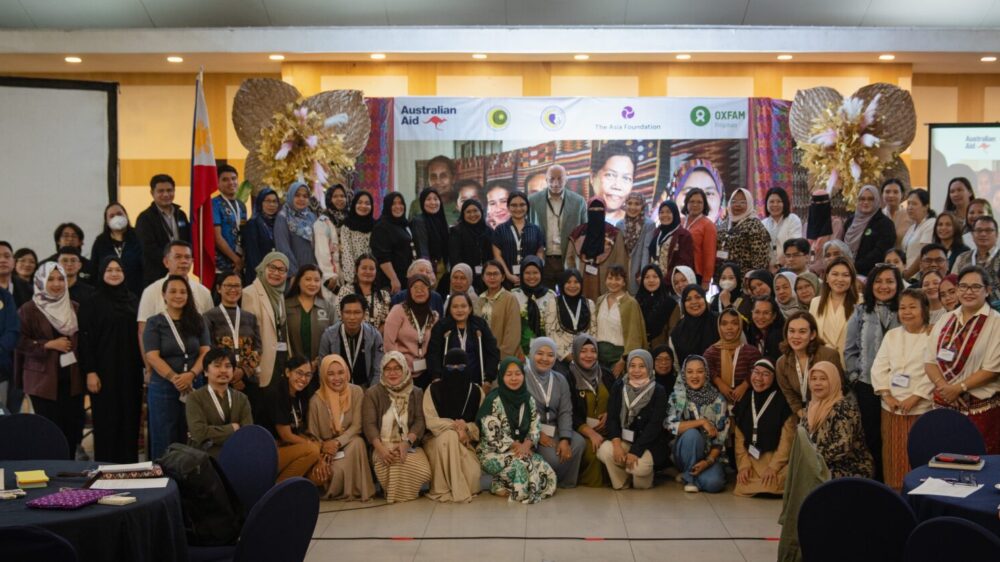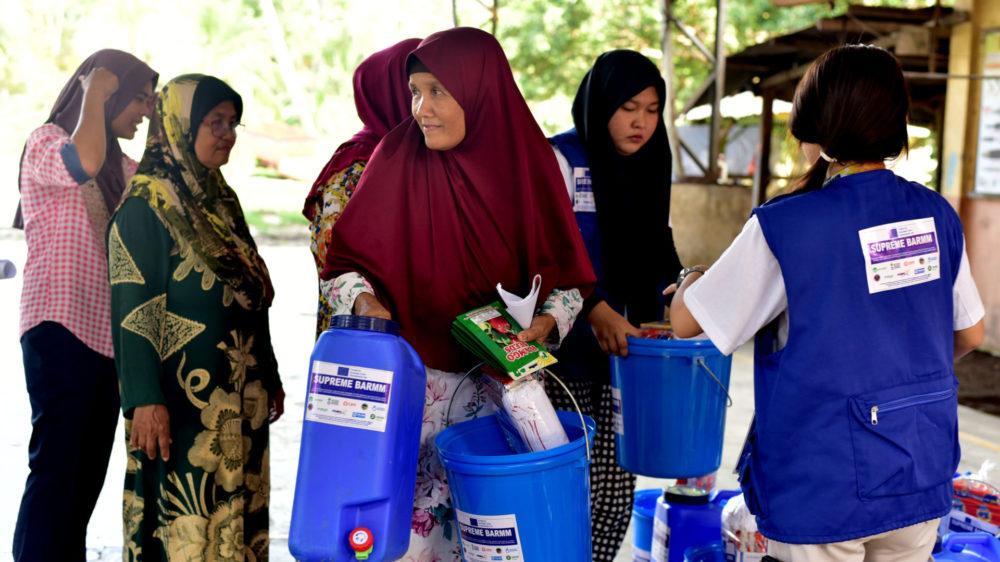The European Union, Oxfam Pilipinas, and their partners have officially launched an initiative aimed at boosting economic opportunities for 54,600 women, youth, indigenous people (IP), and other small producers in the Agri-fishery sector in Basilan, Sulu, and Tawi-Tawi (BaSulTa) provinces in the Philippines.
The launch of the “Strengthening Agri-fishery Enterprise through Women and Youth Empowerment Inclusive Business and Climate Resilience” (WEE-SAFE) project was carried out in Zamboanga City on Wednesday. The event also counted with the participation of the implementing partners Kasanyangan Center for Community Development and Microfinance Foundation, Inc. (KCCDMFI) and the SIAD Initiatives in Mindanao – Convergence for Asset Reform and Regional Development (SIMCARRD), as well as communities, local government unit and government ministries.
Funded by the European Union, under its Bangsamoro Agri-Enterprise Programme (BAEP), the two-year PHP 137 million WEE-SAFE project will employ inclusive value chain and business models to foster lasting peace and promote sustainable development and economic growth, contributing to build the conditions for lasting peace in the BARMM.
“We want to demonstrate an inclusive value chain model where women, youth, indigenous peoples, and other vulnerable groups can participate in economic opportunities that help improve the well-being of their communities,” Oxfam Executive Director Erika Geronimo said. Despite BaSulTa’s rich resources and marine biodiversity, the islands rank among the least developed provinces in terms of enterprise development and productivity for agriculture and fishing. “We have to recognize that investments for women’s economic empowerment are investments to the overall productivity and development of the local economy,” she added.
Myrto Christofidou, the Programme Officer for Peacebuilding and Rural Development of the European Union Delegation in the Philippines shared that a successful implementation of this program will pave the way for sustainable value chain development in the island provinces and beyond. The BAEP will address the main challenges faced by the farmers and small scale companies in the agri-business sector in BARMM and will bring together a multitude of actors, at regional and provincial level.
Smallholder farmers and women-led enterprises face challenges, including little to no access to climate-resilient technologies, Islamic financing, and other forms of capital for micro, small and medium enterprises (MSMEs). They also have less links to the Halal industry value chain.
Women entrepreneurs particularly face more challenges as they are often invisible in the Agri-fisheries sector due to limited access to resources, services, capital, technical inputs, and land, alongside their unpaid care and domestic work responsibilities. One of the women leaders in Basilan, Lucia Belandres of Malo-ong Canal ROSE Women Association, shared that through the initial engagement of WEE-SAFE Project in their community, they were empowered through the learning exchange that shed light on the importance of registering their organization to expand economic opportunities for their members and social enterprise.
Belandres also stressed that, “In these trying times, where we are in the process of recovering from the impacts of the Covid-19 pandemic that disrupted our livelihoods, we will continue to support this kind of initiative. Aside from providing inclusion and opportunity, it also allows BaSulTa to be freed from the centuries-long enchantment to poverty that promotes resilient and sustainable communities, and foster economic growth bound by our cultural roots.”
Although BARMM continues to see improvement as it maintains its top rank as the region with the most fisheries production in the 2nd Quarter of 2023 based on the Philippine Statistics Authority’s (PSA) Fisheries Situation Report, a comprehensive whole-of-nation and society approach is needed to prioritize the inclusion of women, young people, and indigenous people to have improved access to economic opportunities within the Agri-fishery sector.
Oxfam Pilipinas aims to provide a series of capacity-building through the WEE-SAFE project to amplify voices in policy and decision-making spheres for marginalized women. This includes providing linkage to communities for peaceful economic opportunities and enhancing enterprise productivity and commercial viability, focusing on building resilient communities.
Minister Abuamri A. Taddik of the BARMM Ministry of Trade, Investments, and Tourism closed the launching with a strong support for the WEE-SAFE project as it is in line with their vision for sustainable development and prosperity of the Bangsamoro region.
“We thank the European Union for this flagship program in our region and the WEE-SAFE project in pursuing development especially for the agri-fishery enterprises of the Island provinces in BaSulTa that would help bring more jobs, steer economic growth, and open these areas for greater opportunities for inclusive and resilient business models.” he said.
The WEE-SAFE Project is part of European Union’s Php 1.23 billion five-year Bangsamoro Agri-Enterprise Program (EU-BAEP) that focuses on forging lasting peace and promoting sustainable development and economic prosperity in the Bangsamoro Autonomous Region of Muslim Mindanao (BARMM).
###
FOR MEDIA INQUIRIES AND COORDINATION:
European Union Delegation: Thelma Gecolea, Email: Thelma.GECOLEA@eeas.europa.eu
Denvie Balidoy | Senior Officer for Media and Digital Influencing, Oxfam Pilipinas Email: DBalidoy@oxfam.org.uk



